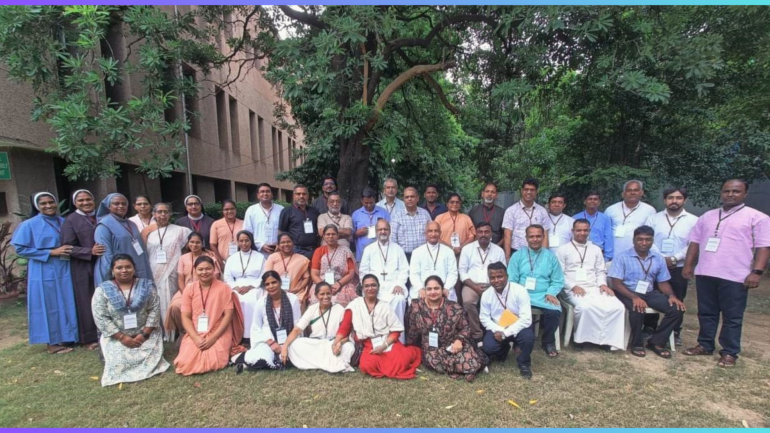India hosts workshop on integral ecology for Agra-North Region

A Joint Agra-North Region Workshop on Integral Ecology, organized by the CBCI Office for Environment and Climate Change, took place from August 24-26, 2024, at Navinta Retreat Centre, Sukhdev Vihar, Okhla, New Delhi.
The workshop gathered 43 participants, including bishops, priests, religious, and laypersons from dioceses representing all three rites: Agra, Ajmer, Allahabad, Bareilly, Bijnor, Delhi, Faridabad, Gorakhpur, Gurgaon, Jaipur, Jalandhar, Jhansi, Jammu-Srinagar, Lucknow, Meerut, Simla-Chandigarh, Udaipur, and Varanasi.
This was the third regional workshop convened by the CBCI Office for Environment and Climate Change, led by Bishop Allwyn D’Silva, Auxiliary Bishop Emeritus of Bombay.
The event followed the National Conference on Integral Ecology held at Dharmaram, Bangalore, and served as a continuation of the Church's commitment to addressing environmental concerns.
On the evening of August 24, Bishop Allwyn D’Silva delivered a homily based on the day’s Gospel, calling for authenticity and concrete actions in caring for creation.
The workshop officially began on August 25 with an inaugural ceremony, followed by Bishop D'Silva's opening address, setting the context for the event.
Sr. Shimi Varghese DHM, Secretary of the CBCI Office for Environment and Climate Change, outlined the workshop's Code of Conduct.
In his keynote address, Bishop Ivan Pereira of Jammu-Srinagar emphasized the need for an interdisciplinary approach to achieve systematic change in caring for "our common home."
He underscored the interconnectedness of nature and humanity as key to developing a sustainable ecological mindset.
Dr. Haridas from Caritas India, the workshop’s main resource person, highlighted the climate crisis facing North India. He called for the creation of climate-resilient communities and stressed the need for ecological conversion, reminding participants that humanity is not separate from nature but part of it.
In the afternoon, participants shared brief presentations of ecological initiatives from their respective dioceses.
Sr. Jyotisha Kannamkal SND spoke on the spiritual aspect of caring for creation, emphasizing the need for ecological conversion and the deep connection between God, humanity, and nature.
"If we are not personally affected, we will not be transformed," she noted.
The day concluded with Mass celebrated by Bishop Deepak Tauro, Auxiliary Bishop of Delhi.
In his homily, he called for a renewal of hearts, stating that the renewal of the earth begins with individuals who serve as true custodians of creation.
On the second day, Mass was celebrated by Bishop Ivan Pereira, who urged participants to work as a unified force in caring for creation, inspired by faith.
He encouraged participants to act together to address the root causes of environmental challenges.
Sr. Jyotisha Kannamkal presented the Laudato Si’ Goals and Action Plan, pointing out that "pollution of the mind" is one of the most significant issues to address.
She outlined the Dicastery's vision for a seven-year journey toward achieving full sustainability in the spirit of Integral Ecology.
During a group session moderated by Bishop Allwyn D’Silva, participants shared strategies to overcome ecological challenges in their dioceses. Bishop D’Silva announced that CBCI would issue a pastoral letter in 2025, marking the tenth anniversary of Laudato Si’. He noted that ecology is a common ground where all three rites can work together.
The three bishops representing the CBCI Agra-North region shared their ongoing initiatives, including awareness programs in schools and parishes, income generation activities for marginalized communities, the reduction of single-use plastics, and alternatives to the wasteful culture emerging from plastic use.
The workshop concluded with a prayer led by Bishop Eugene of Varanasi. (Sr. Shimi Varghese)
Radio Veritas Asia (RVA), a media platform of the Catholic Church, aims to share Christ. RVA started in 1969 as a continental Catholic radio station to serve Asian countries in their respective local language, thus earning the tag “the Voice of Asian Christianity.” Responding to the emerging context, RVA embraced media platforms to connect with the global Asian audience via its 21 language websites and various social media platforms.












